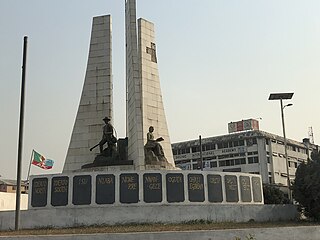Related Research Articles

The federal government of Nigeria is composed of three distinct branches: the legislative, the executive, and the judicial, whose powers are vested and bestowed upon them by the Constitution of the Federal Republic of Nigeria, the National Assembly, the president, and lastly the federal courts, which includes the Supreme Court which is regarded as the highest court in Nigeria. One of the major functions of the constitution is that it provides for separation and balance of powers among the three branches and aims to prevent the repetition of past mistakes made by the government Other functions of the constitution include a division of power between the federal government and the states, and protection of various individual liberties of the nation's citizens.

An oath of office is an oath or affirmation a person takes before assuming the duties of an office, usually a position in government or within a religious body, although such oaths are sometimes required of officers of other organizations. Such oaths are often required by the laws of the state, religious body, or other organization before the person may actually exercise the powers of the office or organization. It may be administered at an inauguration, coronation, enthronement, or other ceremony connected with the taking up of office itself, or it may be administered privately. In some cases it may be administered privately and then repeated during a public ceremony.

Nigeria is a federation of 36 states. Each of the 36 states is a semi-autonomous political unit that shares powers with the federal government as enumerated under the Constitution of the Federal Republic of Nigeria. The Federal Capital Territory (FCT), is the capital territory of Nigeria, and it is in this territory that the capital city of Abuja is located. The FCT is not a state. It is a territory of the Federal Government, administered by Ministers of Government appointed by the President who supervises by the administration of the territory. Each state is subdivided into local government areas (LGAs). There are 774 local governments in Nigeria. Under the constitution, the 36 states are co-equal but not supreme because sovereignty resides with the federal government. The constitution can be amended by the National Assembly, but each amendment must be ratified by two-thirds of the 36 states of the federation.

The president of Pakistan is the head of state of the Islamic Republic of Pakistan. The president is the nominal head of the executive and the supreme commander of the Pakistan Armed Forces. Arif Alvi is the 13th and current president, in office since 9 September 2018.

The president of the Federal Republic of Nigeria is the head of state and head of government of the Federal Republic of Nigeria. The president directs the executive branch of the federal government and is the commander-in-chief of the Nigerian Armed Forces.

The vice president of Nigeria is the second-highest official in the executive branch of the federal government of Nigeria, after the president of Nigeria, and ranks first in the presidential line of succession. Officially styled vice president of the Federal Republic of Nigeria, the vice president is directly elected together with the president to a four-year term of office.

Imo State is a state in the South-East geopolitical zone of Nigeria, bordered to the north by Anambra State, Rivers State to the west and south, and Abia State to the east. It takes its name from the Imo River which flows along the state's eastern border. The state capital is Owerri and the state nickname is the "Eastern Heartland."

The Government of Rivers State consists of elected representatives and appointed officials responsible for the government of Rivers State, Nigeria. Rivers State has a population of about 5 million people, and is one of the 36 states that make up the Federal Republic of Nigeria. The state government is composed of the executive, legislative, and judicial branches, whose powers are vested by the Constitution in the House of Assembly, the Governor and the High Court. The judiciary operates independently of the executive and the legislature. At the local level, elected officials are in charge of local government areas.
Hope Odidika Uzodimma is a Nigerian politician who serves as governor of Imo State since 2020. On 14 January 2020, the Supreme Court of Nigeria declared Uzodimma of the All Progressives Congress (APC) winner of the 2019 governorship poll in Imo State, nullifying the election of the then-incumbent governor Emeka Ihedioha.

Chukwuemeka Ihedioha ; born 24 March 1965) is a Nigerian politician and businessman who served as governor of Imo State from 2019 to 2020. He was removed from office on 14 January 2020, by the Supreme Court of Nigeria which declared the APC candidate the authentic winner of the 2019 gubernatorial election. He was deputy speaker of the House of Representatives of Nigeria from 2011 to 2015.
The governor of Rivers State is the chief executive of the Rivers State government and is one of the governors of the thirty-six states of Nigeria. The governor is supported by the deputy governor, both popularly elected for a term of four years. The governor, as head of the executive branch, has the power to appoint commissioners responsible for each of the state's ministries, the heads of parastatals, judicial officers and the state-owned bodies with specific regulatory or administrative duties. They cannot be a member of the state House of Assembly.
The Lagos State Judiciary is one of the three co-equal branches of the Lagos State Government organized under the Constitution of Nigeria and laws of Lagos State. The Chief Judges are appointed by the State Governor with the consent of the House of Assembly.
Lagos State Government is the government of Lagos State, concerned with the administration of the state ministries. The government consists of the executive, legislative and Judiciary. The government is headed by the Governor who is the policy-maker and often assisted by the commissioners and other civil servants of the state.
The Government of Ogun State consists of elected representatives and appointed officials responsible for the government of Ogun State, Nigeria. Ogun State has a population of about 2 million people, and is one of the 36 states that make up the Federal Republic of Nigeria. The state government is composed of the executive, legislative, and judicial branches, whose powers are vested by the Constitution in the Governor, the House of Assembly, and the High Court. The judiciary operates independently of the executive and the legislature. At the local level, elected officials are in charge of local government areas.

The Deputy Governor of Imo State is the political running-mate of the Governor. He serves as the second-in-command to the governor and he's also the second executive officer of the State.On 15 January 2020, Placid Njoku was sworn in as Deputy Governor of Imo State.
The Government of Imo State also called The Imo State Government consists of elected representatives and appointed officials responsible for the government of Imo State, Nigeria. Imo State has a population of over 4 to 5 million people, and is one of the 36 states that make up the Federal Republic of Nigeria. The state government is composed of the executive, legislative, and judicial branches, whose powers are vested by the Constitution in the House of Assembly, the Governor and the High Court. The judiciary operates independently of the executive and the legislature. At the local level, elected officials are in charge of local government areas.
The 2019 Imo State gubernatorial election in Nigeria occurred on 9 March 2019. PDP's Emeka Ihedioha polled 38.29% of the total votes, defeating AA's Uche Nwosu who got 26.66% of popular votes, and several minor party candidates. Out of 27 LGAs, Ihedioha won in 11, while Nwosu won in 10.
The 1979 Imo State gubernatorial election occurred on July 28, 1979, in Nigeria. NPP's Samuel Onunaka Mbakwe won election for a first term to become Imo State's first executive governor leading and, defeating main opposition, NPN's Collins Obi, in the contest.

The government of Edo State serves as the governing authority for Edo State, one of the 36 states within the Federal Republic of Nigeria. It comprises three branches of government: the executive branch led by the Governor of Edo State, the legislative branch represented by the Edo State House of Assembly, and the judicial branch, including the Judiciary of Edo State and the Courts of Edo State. The state government operates under the frameworks of the Constitution of Nigeria and the Constitution of Edo State, delineating the powers, duties, and functions of state organs and institutions. It also encourages direct participation from the electorate through mechanisms such as initiative, referendum, and ratification.
References
- ↑ "Constitution of the Federal Republic of Nigeria". www.nigeria-law.org. Retrieved 2020-05-07.
- ↑ "Hope Uzodinma takes oath of office, promises a better Imo". Pulse Nigeria. 2020-01-16. Retrieved 2020-05-07.
- ↑ "Constitution of the Federal Republic of Nigeria". www.nigeria-law.org. Retrieved 2020-05-07.
- ↑ "Uzodinma appoints SSG, AG, CPS, others - Premium Times Nigeria". 2020-01-17. Retrieved 2020-05-07.
- ↑ "Uzodinma to set up SEDARC to revamp Imo economy". Vanguard News. 2020-01-22. Retrieved 2020-05-07.
- ↑ "Uzodinma moves to revive ADAPALM - Premium Times Nigeria". 2020-05-07. Retrieved 2020-05-07.
- ↑ Obialor, Adindu (2020-02-27). "Uzodinma signs Imo State revenue administration bill 2020 into law". Daily Post Nigeria. Retrieved 2020-05-07.
- ↑ "Uzodinma names Justice Ijeoma Agugua acting Imo chief judge". Vanguard News. 2020-03-12. Retrieved 2020-05-07.
- ↑ "Uzodinma appoints Njoku President Customary Court of Appeal". Latest Nigeria News, Nigerian Newspapers, Politics. 2020-05-01. Retrieved 2020-05-07.
- ↑ "Uzodinma releases 36 prisoners in Imo". Vanguard News. 2020-05-01. Retrieved 2020-05-07.
- ↑ "Constitution of the Federal Republic of Nigeria". www.nigeria-law.org. Retrieved 2020-05-07.
- ↑ "Supreme Court sacks Imo governor, declares APC winner". 2020-01-14. Retrieved 2020-05-07.